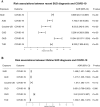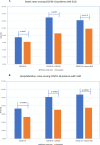COVID-19 risk and outcomes in patients with substance use disorders: analyses from electronic health records in the United States
- PMID: 32929211
- PMCID: PMC7488216
- DOI: 10.1038/s41380-020-00880-7
COVID-19 risk and outcomes in patients with substance use disorders: analyses from electronic health records in the United States
Erratum in
-
Correction: COVID-19 risk and outcomes in patients with substance use disorders: analyses from electronic health records in the United States.Mol Psychiatry. 2021 Jan;26(1):40. doi: 10.1038/s41380-020-00895-0. Mol Psychiatry. 2021. PMID: 32999436 Free PMC article. No abstract available.
Abstract
The global pandemic of COVID-19 is colliding with the epidemic of opioid use disorders (OUD) and other substance use disorders (SUD) in the United States (US). Currently, there is limited data on risks, disparity, and outcomes for COVID-19 in individuals suffering from SUD. This is a retrospective case-control study of electronic health records (EHRs) data of 73,099,850 unique patients, of whom 12,030 had a diagnosis of COVID-19. Patients with a recent diagnosis of SUD (within past year) were at significantly increased risk for COVID-19 (adjusted odds ratio or AOR = 8.699 [8.411-8.997], P < 10-30), an effect that was strongest for individuals with OUD (AOR = 10.244 [9.107-11.524], P < 10-30), followed by individuals with tobacco use disorder (TUD) (AOR = 8.222 ([7.925-8.530], P < 10-30). Compared to patients without SUD, patients with SUD had significantly higher prevalence of chronic kidney, liver, lung diseases, cardiovascular diseases, type 2 diabetes, obesity and cancer. Among patients with recent diagnosis of SUD, African Americans had significantly higher risk of COVID-19 than Caucasians (AOR = 2.173 [2.01-2.349], P < 10-30), with strongest effect for OUD (AOR = 4.162 [3.13-5.533], P < 10-25). COVID-19 patients with SUD had significantly worse outcomes (death: 9.6%, hospitalization: 41.0%) than general COVID-19 patients (death: 6.6%, hospitalization: 30.1%) and African Americans with COVID-19 and SUD had worse outcomes (death: 13.0%, hospitalization: 50.7%) than Caucasians (death: 8.6%, hospitalization: 35.2%). These findings identify individuals with SUD, especially individuals with OUD and African Americans, as having increased risk for COVID-19 and its adverse outcomes, highlighting the need to screen and treat individuals with SUD as part of the strategy to control the pandemic while ensuring no disparities in access to healthcare support.
Conflict of interest statement
The authors declare that they have no conflict of interest.
Figures



Comment in
-
Mechanisms for substance use disorders in COVID-19.Mol Psychiatry. 2021 Sep;26(9):4568-4569. doi: 10.1038/s41380-021-01041-0. Epub 2021 Feb 15. Mol Psychiatry. 2021. PMID: 33589741 Free PMC article. No abstract available.
References
-
- Centers for Disease Control and Prevention (CDC). Coronavirus Disease 2019 (COVID-19) Cases in the United States. https://www.cdc.gov/coronavirus/2019-ncov/cases-updates/cases-in-us.html. Accessed 15 June 2020.
-
- The Substance Abuse and Mental Health Services Administration (SAMHSA) of the U.S. Department of Health and Human Services. Key Substance Use and Mental Health Indicators in the United States: results from the 2018 National Survey on Drug Use and Health. https://www.samhsa.gov/data/sites/default/files/cbhsq-reports/NSDUHNatio.... Accessed 15 June 2020.
Publication types
MeSH terms
Grants and funding
- R01 AG057557/AG/NIA NIH HHS/United States
- R01 AA029831/AA/NIAAA NIH HHS/United States
- AG061388/U.S. Department of Health & Human Services | NIH | National Institute on Aging (U.S. National Institute on Aging)/International
- DP2 HD084068/HD/NICHD NIH HHS/United States
- R56 AG062272/AG/NIA NIH HHS/United States
- R01 AG061388/AG/NIA NIH HHS/United States
- RF1 AG076649/AG/NIA NIH HHS/United States
- AG062272/U.S. Department of Health & Human Services | NIH | National Institute on Aging (U.S. National Institute on Aging)/International
- 1UL1TR002548-01/U.S. Department of Health & Human Services | NIH | National Center for Advancing Translational Sciences (NCATS)/International
- RSG-16-049-01/American Cancer Society (American Cancer Society, Inc.)/International
- UL1 TR002548/TR/NCATS NIH HHS/United States
LinkOut - more resources
Full Text Sources
Other Literature Sources
Medical
Miscellaneous

